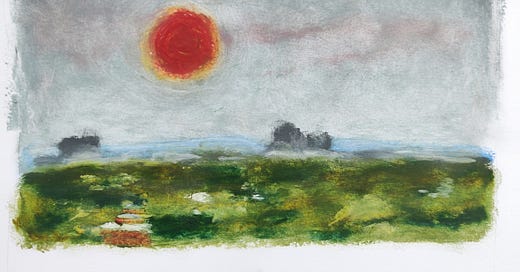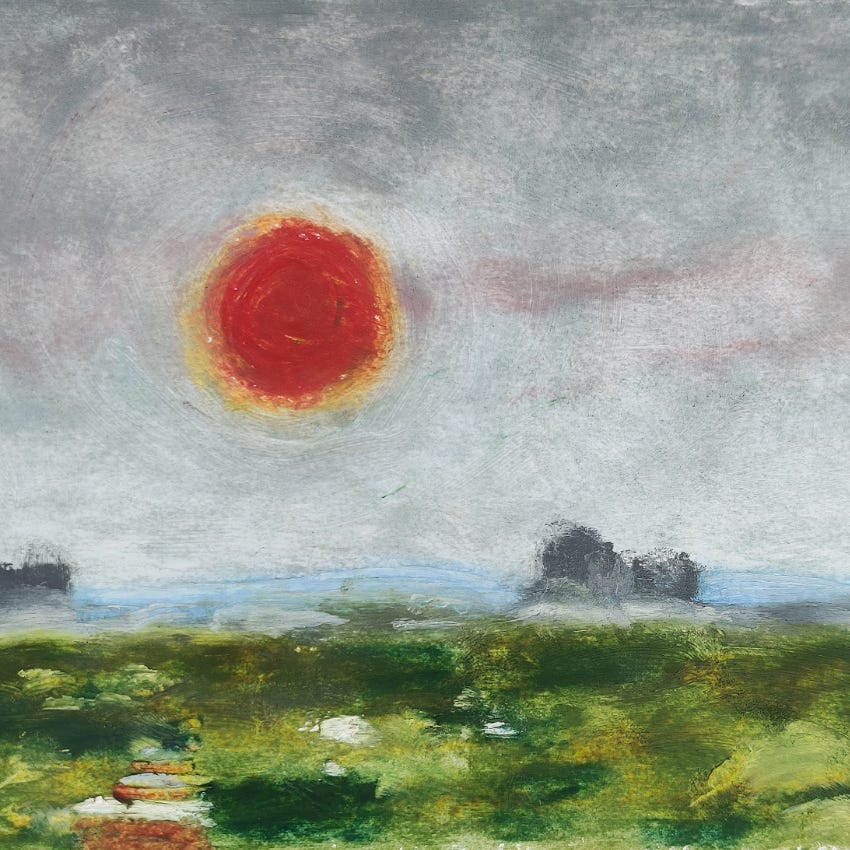Wildfire smoke over Montreal, looking north, June 8, 2025
Our weekend was graced with warmer weather, at last, but few could enjoy it. People were advised to stay inside their homes because of the high levels of particulate matter from the wildfires in Manitoba. The air quality index got as high as the 170s here. On Saturday the sunset was apocalyptic — a blurry orange sun burning in a grim, murky sky. This morning the air quality index is down to 97 and the severe alert has been cancelled, but looking out from my north-facing studio window, the low-lying smoke persists even though I can see faint patches of pale blue high above.
American friends in the Northeast also experienced some of this pollution, though not yet to the levels of last summer. I’m always taken aback when people say things to me like, “Yes, we had some of your smoke,” or even, “Thanks a lot, Canada.” Like casually tossed-off racist, anti-feminist, or anti-LGBTQ+ remarks, I experience these nationalistic comments as micro-aggressions. (I’m sure it would be far worse if I lived in Mexico.) Wildfires caused by climate change are happening everywhere, including the US and Europe, mainly originating in huge tracts of northern forest -- but no longer confined to those mostly-unpopulated areas, as we’ve seen recently in Los Angeles. This is not “Canadian smoke” - it is our smoke collectively, caused by global behavior and governments’ refusals to legislate fundamental change. Clearly there have to be major changes in forest management, but if you really think about the extent of the boreal and northern forests, you will quickly realize what a daunting task that is. Canada shares in that responsibility, and its own climate record is not good. But shall we start blaming the Arctic and Antarctic for the melting ice and rising sea levels? Shall we blame the south for the fact that ticks are moving north? In actuality, the fires are a symptom of an underlying disease, caused by all the industrialized nations. Massive car traffic isn’t occurring in the Yukon, but in Miami, Beijing, New York, Singapore. Fossil fuels are being burned by airplanes all over the planet; too many of us have a seemingly insatiable desire for comfort, convenience, variety and luxury in our diets and lifestyles, while too many others have no choice at all. We are all part of that web of interconnected systems and behavioral choices; it’s our responsibility to make the climate a primary issue when we vote, and to change our own behaviors.
I’ve come to see the smoky skies as a symbol of a much larger obscurity — the ongoing obscurity of the truth about just about everything, and the accompanying refusal to admit cause and effect. There’s a great desire right now to assign blame for all the ills of our world, and to shift it away from ourselves onto other groups — which conveniently often end up to be the victims themselves. The most egregious and tragic example of this has been the blaming of the Palestinians for the horrific genocide of their own people in Gaza — blame that goes all the way back to 1948 when their land was forcibly taken from them.
In the last few days, we’ve seen the government and the media putting a spin on the immigration protests in L.A., attempting to shift blame from the root cause — the terrifying and totally unacceptable military tactics being used to round up immigrants to meet new federal quotas — to the actions of the protesters, who, though angry, have remained largely peaceful. The rhetoric has been exaggerated even to the point of calling the protests “an insurrection,” with the immigrants themselves being labeled as terrorists and criminals, and the protesters as “radicals”. I made a point of watching footage and media coverage from a number of different international and national outlets, and the differences in the words used, and the videos shown, are blatant and deliberate.
Mexico and Canada are blamed already for America’s drug addiction; Muslims are blamed for domestic terrorism when much of it is caused by white supremacists, and the root causes are seldom discussed. I could give countless other examples, but most of the people reading here already know them.
What can we do? We may not be directly responsible for wars, the climate crisis, the rise of fascism, the spinelessness and collusion of mainstream media. However, history shows us that passivity allows these terrible things to flourish. We can inform ourselves, and speak our truth to others; we can engage at least a little, instead of hiding in our own frustration, exhaustion, and helplessness. We need to do that quietly, firmly, and calmly, knowing how we feel and why, and being able to say it with integrity and conviction in a way that invites dialogue. That is always the first step: “I’m upset about the air quality too and I’m sorry it’s affecting you. But I see it differently — this isn’t just ‘Canada’s smoke’ — we’re all in this, we all own it. What do you think needs to be done?” Or, “I’m upset enough about what’s happening to go to a No Kings Day protest on June 14. Would you consider coming with me?”






Yes, yes, and yes. The smoke, the culture, the collapse, the obscurity, the rhetoric, the denial, it's all connected. This may be my favourite essay of yours. Every word of it. And the painting is among your very best.
Thank you so much for this - speaking the truth in such a clear calm way. So many people seem to be hiding from the reality of what's happening - which I do understand. Then too there is often either so much despair or anger or anguish in people's voices that it's hard to listen, when of course we are filled with those emotions too. This fills me with calm determination.